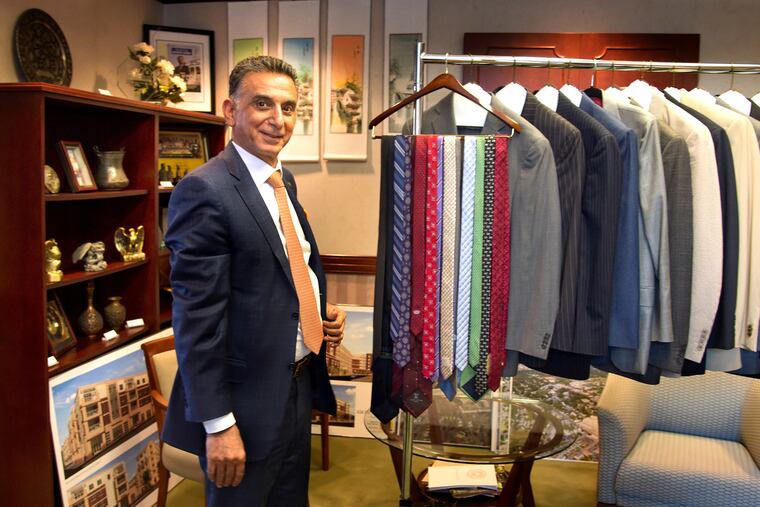'I would like people not to experience what I experienced’: Rowan president helps students dress for success
Rowan University is collecting donations of gently used professional and business attire for men and women so that student on tight budgets can dress for success at job or internship interviews.

Like me, Rowan University President Ali A. Houshmand remembers being fresh out of college and buying his first new suit.
“I still have pictures of me in it," he says.
(Fortunately, all known photos of me sporting the groovy plaid number I got at Wanamaker’s in 1976 have been torn up, burned, or both.)
When he bought his first suit in 1982, Houshmand, now 64, was not exactly a man of means. So he can empathize with soon-to-graduate Rowan students who are hard-pressed to afford appropriate professional attire. And “Houshmand’s Hundred-Day Challenge,” his effort to help them out, has attracted more than 300 donations of business attire for women or men since launching Dec. 1.
“We’re a blue-collar institution, and for some of our students a $300, $400 or $500 suit is out of reach," he said recently from Rowan’s main campus in Glassboro. "In my view, a university cannot say it is doing its job unless graduates end up becoming successful citizens.”
The challenge has its roots in Houshmand’s personal donation of suits and ties to the student center in Glassboro three years ago. The effort greatly expanded in 2018 to include the Stratford and Camden campuses, as well, and is scheduled to continue through March 10. Suits, dresses and other business attire must be dry-cleaned and at most, gently used; shoes are welcome.
"We’ve got clothing coming in from everywhere, ” Rowan spokesman Joe Cardona said Monday. “It’s a little overwhelming.”
The campaign’s initial goal of 100 ensembles was modest because the university “really didn’t know how many people” would respond, Cardona said. “There actually is a great need.”
(Indeed, as my colleague Susan Snyder reported last fall, one-third of Temple University students responding to a survey said they had experienced food or housing insecurity.)
Robert W. Bullard, director of Rowan’s office of career advancement, is heartened by the response from the community inside and outside the university.
“We’ve got three racks in our office. The meeting table is full of suits," he said.
"We’ve seen students come in who need a tie or a blouse or a blazer, or shoes and slacks, and we’ve been able to help them. Everyone becomes a fashion designer.
“We don’t want clothing to be a barrier for students getting a job, or an internship. Lots of students don’t have a closet full of clothes,” said Bullard. "A suit may be just the thing they need.”
The challenge is not the first time Houshmand, who grew in a family of 10 children in Iran, is working directly to help students in need. Earlier in 2018, he began funding scholarships by selling his homemade, ultra-spicy brand of Hazardous Hot Sauce, including a favorite he’s branding “Nastylicious.”
Before the holidays, hot sauce sales already had yielded more than $25,500 for the scholarship fund, Cardona said.
The hot sauce and clothing campaigns are an expression of gratitude, said Houshmand, who wore hand-me-downs as a boy.
“I remember not being able to afford clothes, and I would like people not to experience what I experienced,” he said. “I became the president of a major university, which is priceless. How can I not feel grateful?”